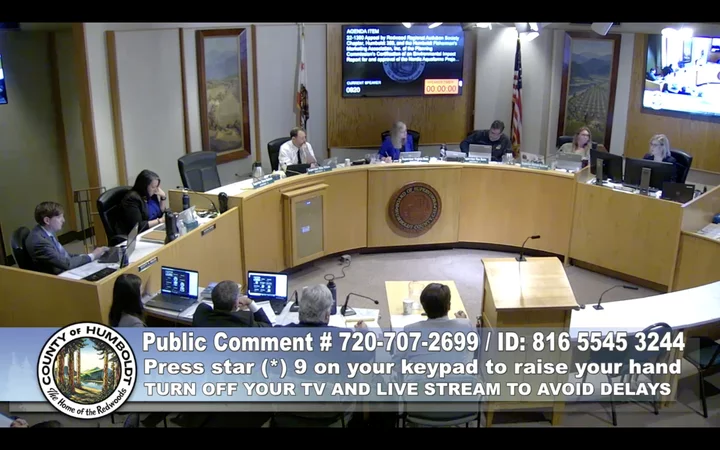Humboldt County Board of Supervisors. | Screenshot.
###
Norway-based Nordic Aquafarms just cleared a major hurdle in its efforts to demolish a dilapidated pulp mill site and build a $650 million land-based fish farm on the Samoa Peninsula.
At the end of an all-day hearing Wednesday, a shorthanded Humboldt County Board of Supervisors denied an appeal brought by two environmental organizations and the Humboldt Fishermen’s Marketing Association.
The vote was unanimous, 4-0, with Fifth District Supervisor Steve Madrone absent due to a family emergency. Prior to the vote, Third District Supervisor Mike Wilson sought additional commitments from Nordic, based on a variety of community concerns, and following a half-hour of closed-door negotiations between staff and company executives, Nordic agreed to a few additional conditions.
For example, the company committed to giving an annual sustainability report describing efforts to decarbonize its trucking activities, the greenhouse gas impacts associated with its fish feed and other relevant issues. The invitation-only meetings will include non-government organizations, community leaders, academia, tribal government leadership and members of the public.
Planning and Building Director John Ford said a forum will be created “where issues and solutions are discussed by all [and] agreed-upon elements can be incorporated into Nordic’s sustainability goals in the following years.”
Nordic committed a minimum of $25,000 annually, to be combined with matching funds and sponsorships to finance community projects, Ford said.
Nordic executives did push back a bit on some other requests from Wilson, including one to devote money to purchasing carbon sequestration credits from local projects and another that asked for regular testing of the effluent stream. Regarding the latter, the executives argued that the meaningful testing will be done on the fish within the factory whereas testing for DNA and RNA matter in the effluent could be misleading, giving false positive results that don’t actually say anything about the effluent’s potential risks.
“So the struggle there is that requiring the testing would not result in achieving anything that provided anything meaningful,” Ford said. “It would require them to do work, but it may or may not produce results that are of value.”
As for the proposal to require Nordic to purchase carbon sequestration credits, Ford noted that the project’s Environmental Impact Report doesn’t consider greenhouse gas emissions from fish feed. Earlier in the meeting he made an analogy, saying this calculation was akin to asking a grocery store to account for the operations of a dairy that supplies its milk and cheese. And he said environmental case law says any requirements must have rough proportionality to the impact being created.
“And so you can’t just apply a fee that is inconsistent with achieving an objective or mitigating an impact,” he said. However, he added that these rules become irrelevant when an applicant — Nordic, in this case — is willing to agree to such a condition of their own free will.
Ford went on to say Nordic had agreed to a new condition whereby, before moving on to phase two of construction, the project must be operating in compliance with the county-issued Coastal Development Permit along with any other local, state or federal permits.
Today’s ruling isn’t the only green light Nordic needs. In order for the project to proceed, Nordic Aquafarms California, LLC, a subsidiary of the Norwegian corporation, must obtain additional permits, as must the Humboldt Bay Harbor, Recreation and Conservation District. For example, the California Coastal Commission and the North Coast Regional Water Quality Control Board must approve plans for water intake and ocean outfall infrastructure.
But the county is considered the lead agency under the California Environmental Quality Act, making it responsible for certifying the project’s Environmental Impact Report and approving the necessary Coastal Development Permit and Special Permit.
The appeal was brought by the Redwood Region Audubon Society, 350 Humboldt and the Humboldt Fisherman’s Marketing Association, all of which had representatives on hand Wednesday to argue their position — namely, that the environmental report is insufficient and the project should be further evaluated via additional studies to consider broader elements of the anticipated impacts, including energy usage, greenhouse gas emissions, biological impacts and more.
Prior to voting to deny the appeal, Wilson said the projects isn’t exactly where he wants it to be in relation to greenhouse gas emissions and other impacts.
“But I’m going to say that we have an opportunity here with relationship to cleanup of this site,” Wilson said. “We have an opportunity with relationship to economic development beyond this, in terms of other opportunities. And I think there are opportunities to improve even this project moving forward. … And I’m hopeful that we have an applicant that is there with his community in doing those things.”
Second District Supervisor Michelle Bushnell thanked county staff and Nordic personnel, saying the project is “not perfect to our community standards, but I hope that you recognize that this is our home … [and] we want our community thought about in that partnership.”
###
PREVIOUSLY:
- Nordic Aquafarms Lays out Next Steps After Planning Commission Gives the Thumbs-Up to Their Samoa Fish Farm Plans
- Fishermen and Conservation Groups Appeal Nordic Aquafarms’ Environmental Report Certification to Humboldt County Supervisors
- Supes Scheduled to Hear Appeal of Nordic Aquafarms Project at Special Meeting Wednesday

CLICK TO MANAGE